A series by Christopher James
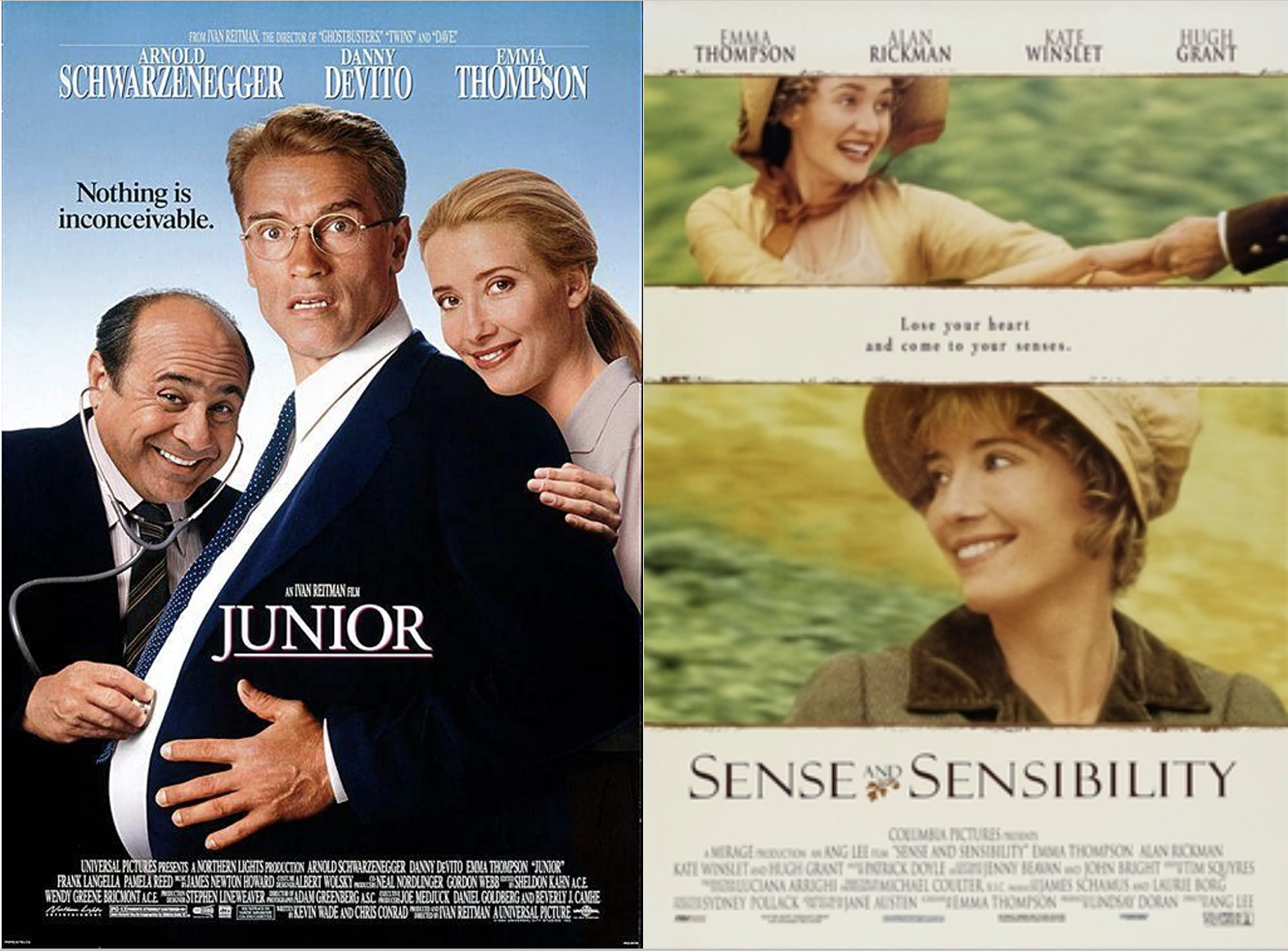 Emma Thompson's output between 1994 and 1995 couldn't be more different.
Emma Thompson's output between 1994 and 1995 couldn't be more different.
Do one for them; do one for you. If you can still do projects for yourself, you can keep your soul.
— Martin Scorsese: A Journey
Emma Thompson was on a pretty incredible run in the early 90s. Following her Best Actress win in 1992 for Howard’s End, Thompson had a consistent streak of great films. In 1993, she received two acting nominations for her work in The Remains of the Day and In the Name of the Father. On top of that, she was delightful in the critically lauded Peter’s Friends and Much Ado About Nothing (the latter perhaps the hottest film of the 90s). By 1995, she would win her second Oscar for Sense and Sensibility in the Adapted Screenplay category. Every track record is bound to have a blemish. Sandwiched in between Merchant & Ivory and Ang Lee is Ivan Reitman’s infamous Junior, better known as the movie where Arnold Schwarzenegger gets pregnant.
Was starring in an Arnold Schwarzenegger comedy the means to the end of getting her passion project made?
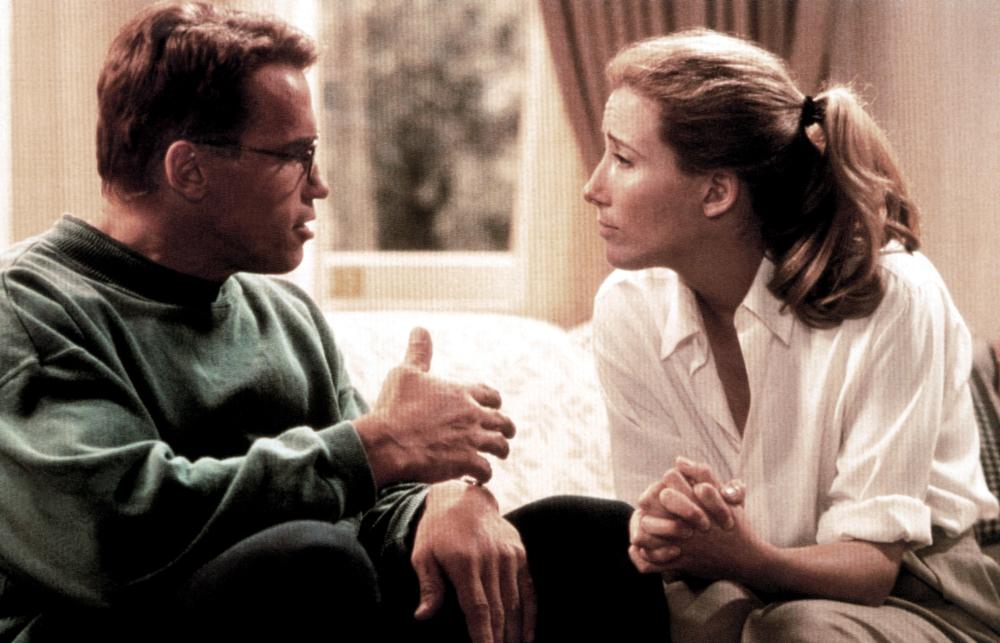 During their "falling in love" scene, Thompson's character Diana confesses she prefers a man with a bit of a belly. If only she knew...
During their "falling in love" scene, Thompson's character Diana confesses she prefers a man with a bit of a belly. If only she knew...
In short, yes, and it was a worthy trade off. Thompson is very open about choosing money in her “one for them” choice with Junior.
“I hadn’t been back to America since Dead Again. It was quite a lot of money; [director] Ivan Reitman had made some wonderful comedies; and I was fascinated by it as an idea. We had a lot of fun making it. Arnold was very considerate with me and rather touching, because he said, ‘I don’t know how to act so you have to do the acting. You tell me if you think I’m doing it okay.’ ”
- Emma Thompson in Parade Magazine
Just because Junior sounds absurd doesn’t mean that, on paper, it didn’t seem like a good idea for Thompson’s career (and bank account). After all, the collaborators made this seem like a sure thing. Ivan Reitman had teamed up with Schwarzenegger and DeVito on 1988’s Twins and with Schwarzenegger for Kindergarten Cop. Unfortunately, even with a prime Thanksgiving release, the film didn’t make back its budget domestically. Even with poor box office and a critical drubbing (at least Siskel & Ebert gave it two thumbs up), Junior still factored into the awards race. Schwarzenegger and Thompson both received Golden Globe nominations and the song “Look What Love Has Done” was nominated at both the Oscars and Golden Globes. No matter the project, Thompson was on a hot streak with voting bodies that could not be cooled.
Strangely, the movie is not nearly as bad as you might assume. The logline suggests that Junior could easily slip into wall-to-wall transphobia, which was more than commonplace in comedies throughout the 90s (see Soapdish, Ace Ventura: Pet Detective and more). I wouldn’t say it is progressive, but it does feature a very pregnant Schwarzenegger punching a man and bellowing “my body, my choice.” What saves the movie from being abhorrent is the level of sweetness that Reitman and company bring to the story.
The movie doesn’t ask us to laugh at Schwarzenegger (okay, it does a bit in the first act). Instead, the second act gives us an interesting turning point. DeVito’s OBGYN, Dr. Larry Arbogast, impregnates Schwarzenegger’s scientist, Dr. Alex Hesse, (consensually) in order to prove their fertility drug works. By the second trimester, Alex fully embraces his pregnancy. The goal is no longer to conceal his pregnancy, but find a way to bring it to term so that Alex can raise the child. Additionally, his “pregnancy brain” makes him more vulnerable and open, thus attracting the affection of Dr. Diana Reddin, who just so happens to be the egg donor for Alex’s baby (that part was non-consensual).
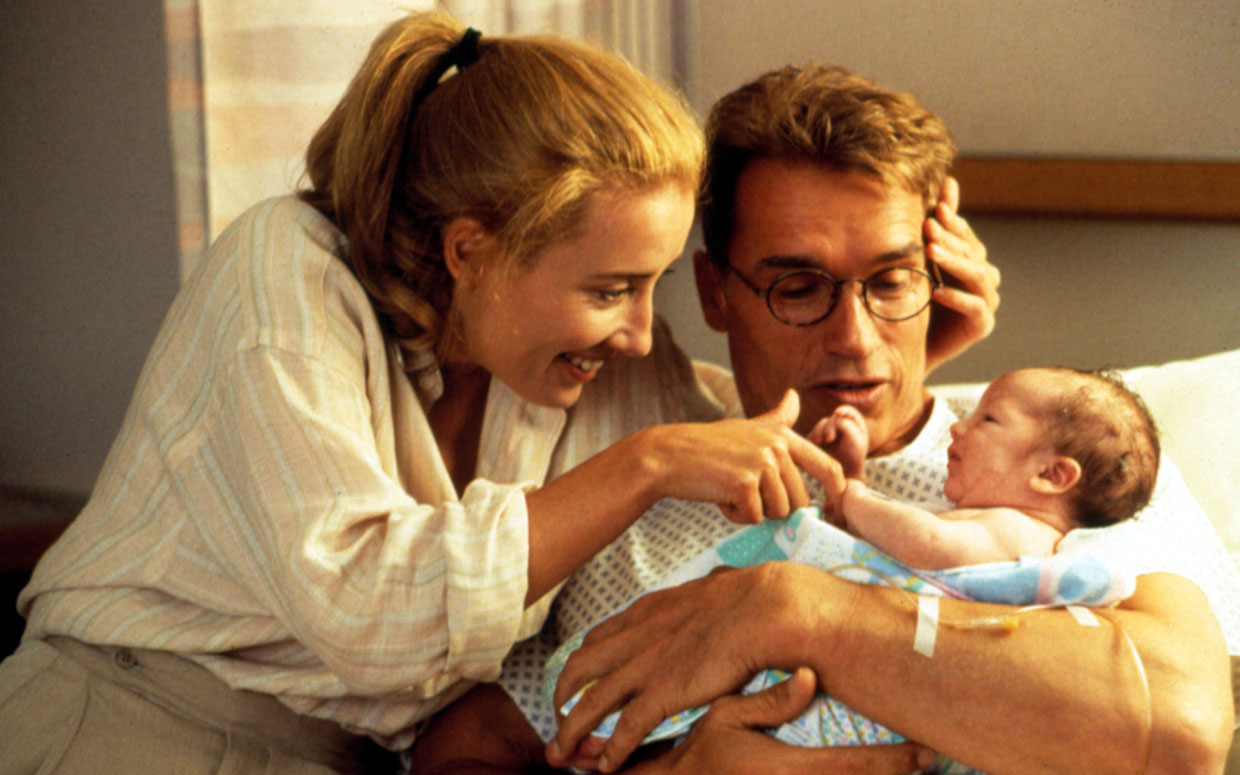 Imagine how a child with Emma Thompson and Arnold Schwarzenegger's genes would look.
Imagine how a child with Emma Thompson and Arnold Schwarzenegger's genes would look.
Thompson and Schwarzenegger have a believably strange chemistry as two driven, awkward loons who enjoy being silly together. It’s no secret that the camera loves it when Emma Thompson has fun. Much Ado About Nothing happens to be one of my favorite performances of hers due to the way it delights in her boundless energy and beauty. Junior is a much worse film, but it does embrace Thompson’s smile and comic charms. A lesser film would’ve wasted her character even more than this film does in favor of the DeVito/Schwarzenegger sparring).
The final act of the film comes closest to a strange, wonderful comedy that could work today. Alex takes refuge in a women’s retreat to buy Larry time as he figures out how to perform a C section for his friend. While there, Alex befriends all of the women and finds a kinship that is new and exciting for him. Even though he sticks out like a sore thumb (Schwarzenegger is in drag during this section), he finds acceptance as he barrels towards his due date. Schwarzenegger plays the character with a great deal of sincerity, radiating carefree happiness as he hangs out with the girls. Similarly, once Alex has the baby, Thompson also reacts with a matter-of-fact joy. A family can look like anything. Why laugh when you feel happy for this odd couple?
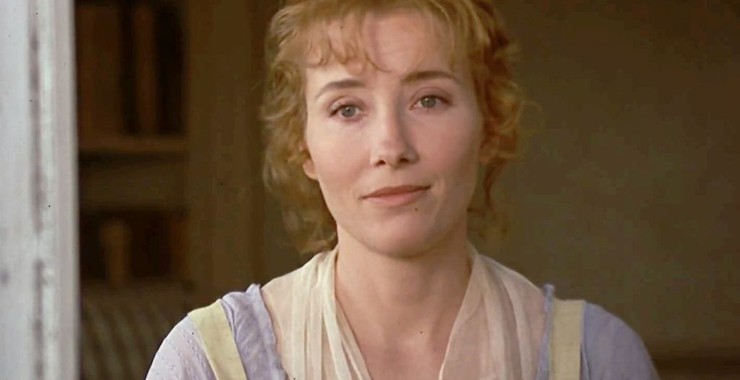 The first time was the charm for Emma Thompson. "Sense and Sensibility" was her first produced theatrical film script, though she had written for British TV previously.
The first time was the charm for Emma Thompson. "Sense and Sensibility" was her first produced theatrical film script, though she had written for British TV previously.
While Thompson clearly had fun with Junior, it was hardly the story she yearned to tell. In fact, she had started writing Sense and Sensibility long before cameras rolled on Junior. Thompson worked on the script for five years, with many of the early drafts being handwritten. The hard work in front and behind the camera paid off. Not only did Thompson win her second Academy Award for the film, but she also had the biggest commercial hit of her career. Based on Jane Austen’s classic novel, the film tells the story of 19th century sisters Eleanor (Thompson) and Marianne (Kate Winslet) Dashwood who find themselves destitute following their Father’s death. The women balance marrying for love or for money as they try and regain their position in society.
“There is a tremendous realism to Austen, because she was a spinster of the parish, dependent on her relations. And although I don’t think she ever felt the pinch, she’s very realistic about the fact that love is all very well, but if you’ve got somebody who loves you and you don’t really have the ‘competence,’ the money to live on, don’t think he wouldn’t give you up for somebody who does. And you’re going to blame him? It’s very mordant. And even though it strikes one as all so very romantic, finally it isn’t.”
- Emma Thompson in an LA Times interview in 1995
Sense and Sensibility may feature two beautiful romances, but it is not a love story. Thompson wisely focuses the script on the sisters, two headstrong women who take different approaches to keep their family afloat. Right away, we see how the Dashwood sisters approach adversity differently as new houseguests descend on Norland Park, forcing them to become second class citizens in their own home. Eleanor tries to make the best of the situation, hoping her steadfastness will unlock some potential gain for the family. Meanwhile, Marianne embraces defiance, never letting her horrid sister-in-law, Fanny (Harriet Walter) feel welcome. Every time they are on screen together, Thompson and Winslet have an electric chemistry. Like actual sisters, the two women convey an unspoken language all their own. It’s beautiful to watch.
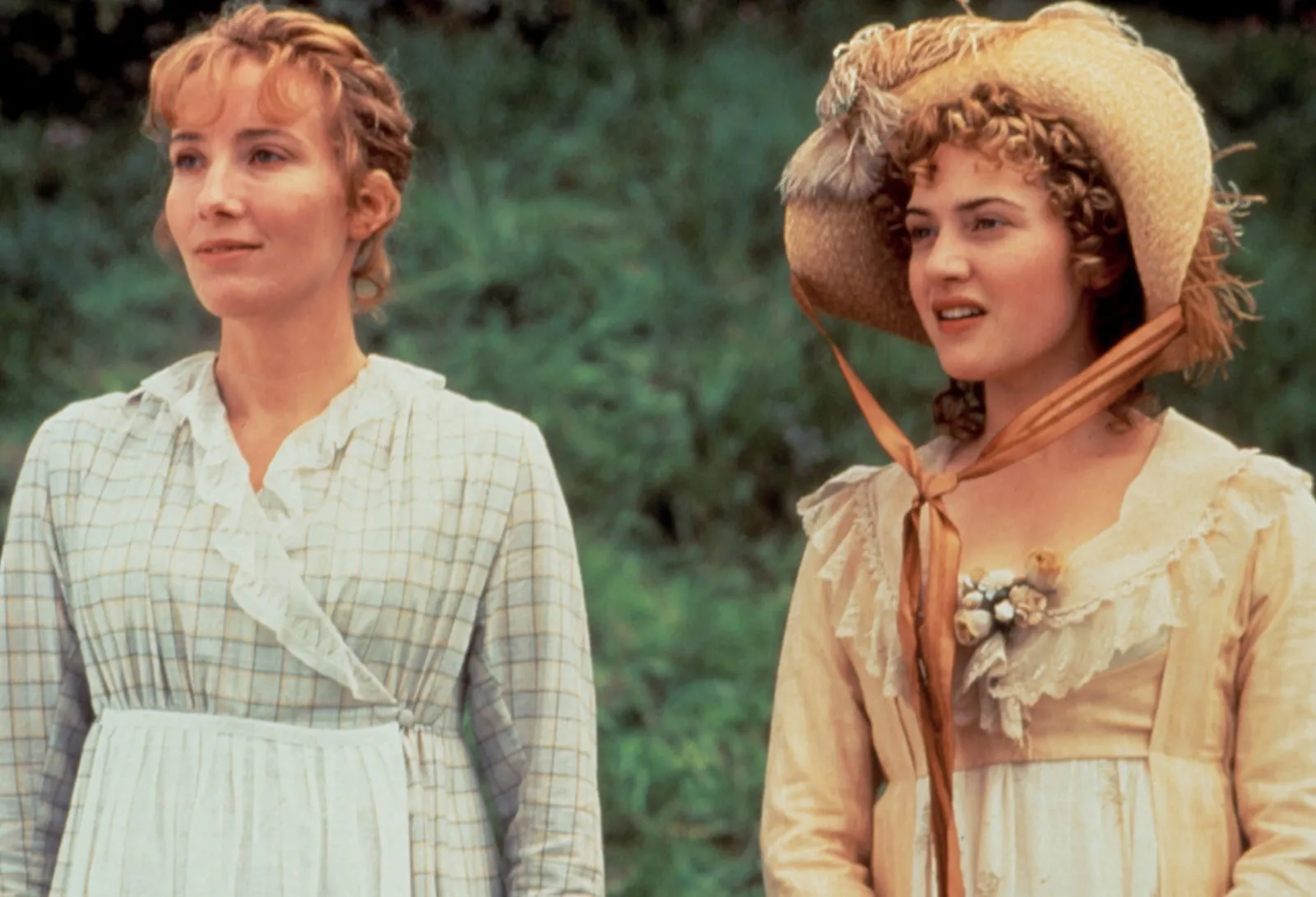 Screw romance. The real chemistry at the heart of "Sense and Sensibility" is between Thompson and Kate Winslet as the Dashwood Sisters.
Screw romance. The real chemistry at the heart of "Sense and Sensibility" is between Thompson and Kate Winslet as the Dashwood Sisters.
The sisterhood may be the center of the story, but their relationship isn’t the driving force of conflict in the film. The conflict between heart and head plagues every character, causing a Rubix cube of marriages and miscommunications. Eleanor is immediately taken by Fanny’s brother, Edward Ferras (Hugh Grant), from his first visit to Norland Park. The feeling is clearly mutual, but Eleanor’s financial status makes her feel unworthy of the handsome and rich Edward. Eventually, Edward finds his way into the heart of Eleanor’s friend Lucy. After years and many trips to the rumor mill, Eleanor is finally reunited with Edward and realizes he is single and ready to marry her. Thompson lets out an exasperated, beautiful cry. She’s not just happy that she has found the love of her life. She’s crying because this turbulent roller coaster of love and status has reached a lovely conclusion.
To this day, Emma Thompson is synonymous with good taste. This year alone, she has won rave reviews for her starring role in Good Luck to You, Leo Grande, a two hander about a middle aged woman who hires a sex worker. It’s incredible to watch her still take exciting risks over thirty years into her film career. However, no one works for that long in Hollywood without making some compromises. Luckily, Emma Thompson’s “One For Them” films are just as idiosyncratic as her best pieces of work.
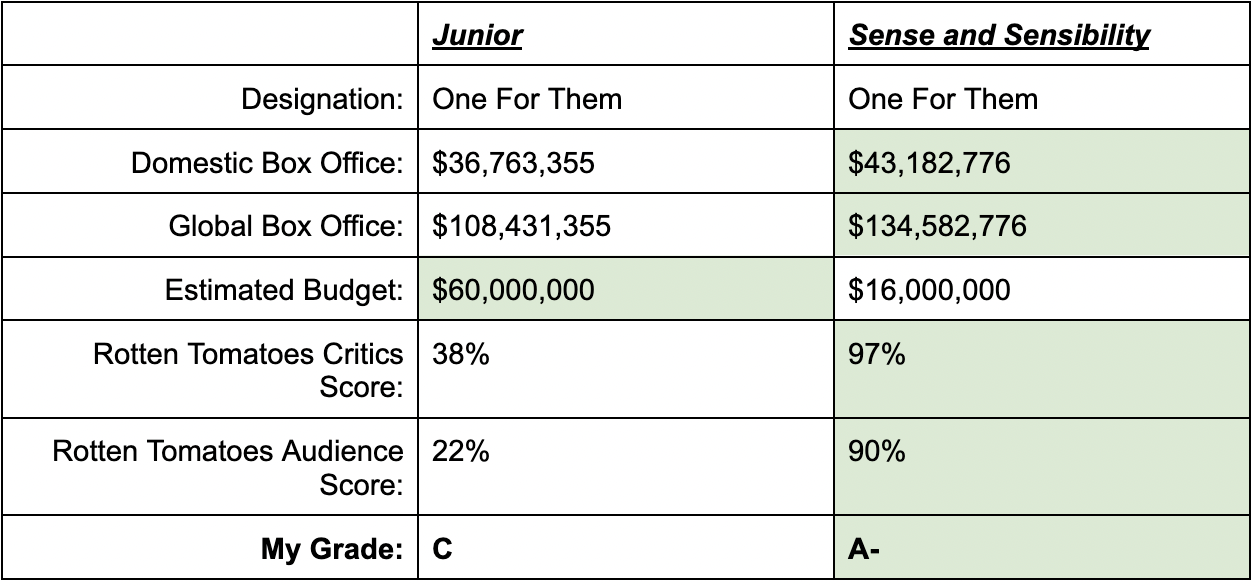
Who do you prefer - Jane Austen or Arnold Schwarzenegger? Let us know in the comments.